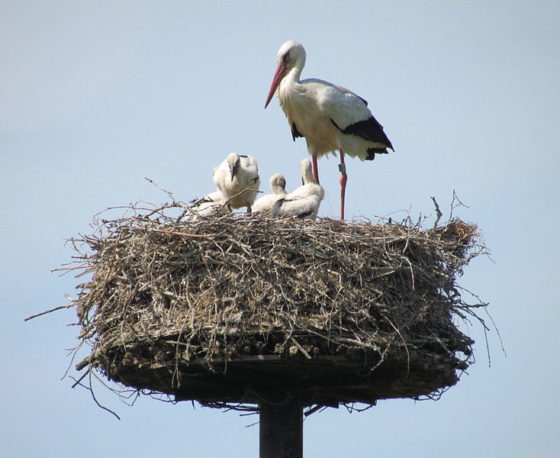After badgers, it’s storks that threaten train services


While track operator ProRail has its hands full trying to remove badgers from underneath the tracks in some 40 places in the Netherlands, nesting storks are now becoming a threat to train services from above.
In the vicinity of Meppel in Drenthe alone, 29 stork pairs have been using overhead line poles to make their nests, which can easily fall onto the track, trains or points, ProRail ecologist Folkert Volbeda said.
‘Storks’ nests can easily weigh hundreds of kilos, which can damage overhead lines or even fall on top of passing trains,’ Volbeda said.
The site is dangerous for the storks themselves as well. There’s is a risk of electrocution and train drivers frequently report crashes with the birds around the nest sites.
Storks like the high poles, Wim van Nee, who runs stork protection organisation STORK said. ‘They are perfect really, with a view and safe from predators and people. They often stay for years and add to their nests continuously,’ he told RTL Nieuws.
Storks, like badgers, are a protected species after having all but disappeared from the Netherlands in the 1970s. Special dispensation is needed to remove nests and ProRail will have to offer the birds alternative accommodation.
ProRail is currently trying to lure the storks to designated nesting poles but a lack of terrain sufficiently distant from the track is hindering their attempts at rehousing the birds.
‘If we put up poles too close to the tracks they will simply return to their old nests, and we can’t expect our neighbours to welcome ‘our’ storks, Volbeda said.
ProRail is predicting more storks on the line in the near future. ‘It’s great to see them do well but we’d rather they nested in a safe spot’, the rail operator said.
Thank you for donating to DutchNews.nl.
We could not provide the Dutch News service, and keep it free of charge, without the generous support of our readers. Your donations allow us to report on issues you tell us matter, and provide you with a summary of the most important Dutch news each day.
Make a donation